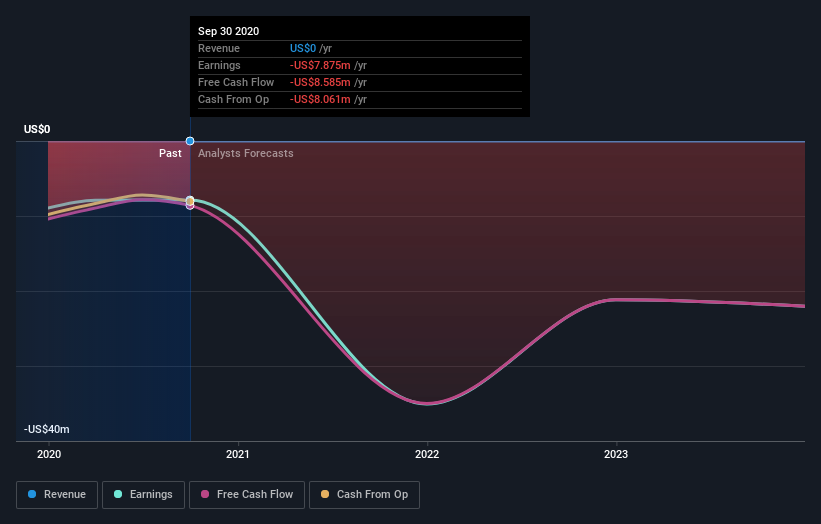What Kind Of Investors Own Most Of Brooklyn ImmunoTherapeutics, Inc. (NASDAQ:BTX)?
The big shareholder groups in Brooklyn ImmunoTherapeutics, Inc. (NASDAQ:BTX) have power over the company. Institutions often own shares in more established companies, while it's not unusual to see insiders own a fair bit of smaller companies. Warren Buffett said that he likes "a business with enduring competitive advantages that is run by able and owner-oriented people." So it's nice to see some insider ownership, because it may suggest that management is owner-oriented.
Brooklyn ImmunoTherapeutics is not a large company by global standards. It has a market capitalization of US$452m, which means it wouldn't have the attention of many institutional investors. Taking a look at our data on the ownership groups (below), it seems that institutions are noticeable on the share registry. Let's delve deeper into each type of owner, to discover more about Brooklyn ImmunoTherapeutics.
See our latest analysis for Brooklyn ImmunoTherapeutics
What Does The Institutional Ownership Tell Us About Brooklyn ImmunoTherapeutics?
Many institutions measure their performance against an index that approximates the local market. So they usually pay more attention to companies that are included in major indices.
Brooklyn ImmunoTherapeutics already has institutions on the share registry. Indeed, they own a respectable stake in the company. This implies the analysts working for those institutions have looked at the stock and they like it. But just like anyone else, they could be wrong. It is not uncommon to see a big share price drop if two large institutional investors try to sell out of a stock at the same time. So it is worth checking the past earnings trajectory of Brooklyn ImmunoTherapeutics, (below). Of course, keep in mind that there are other factors to consider, too.
Brooklyn ImmunoTherapeutics is not owned by hedge funds. Looking at our data, we can see that the largest shareholder is Charles Cherington with 11% of shares outstanding. Meanwhile, the second and third largest shareholders, hold 9.3% and 4.7%, of the shares outstanding, respectively.
A closer look at our ownership figures suggests that the top 13 shareholders have a combined ownership of 51% implying that no single shareholder has a majority.
Researching institutional ownership is a good way to gauge and filter a stock's expected performance. The same can be achieved by studying analyst sentiments. There is a little analyst coverage of the stock, but not much. So there is room for it to gain more coverage.
Insider Ownership Of Brooklyn ImmunoTherapeutics
The definition of an insider can differ slightly between different countries, but members of the board of directors always count. Company management run the business, but the CEO will answer to the board, even if he or she is a member of it.
Insider ownership is positive when it signals leadership are thinking like the true owners of the company. However, high insider ownership can also give immense power to a small group within the company. This can be negative in some circumstances.
Our information suggests that insiders maintain a significant holding in Brooklyn ImmunoTherapeutics, Inc.. It has a market capitalization of just US$452m, and insiders have US$152m worth of shares in their own names. I would say this shows alignment with shareholders, but it is worth noting that the company is still quite small; some insiders may have founded the business. You can click here to see if those insiders have been buying or selling.
General Public Ownership
The general public, with a 43% stake in the company, will not easily be ignored. While this size of ownership may not be enough to sway a policy decision in their favour, they can still make a collective impact on company policies.
Private Company Ownership
Our data indicates that Private Companies hold 11%, of the company's shares. It's hard to draw any conclusions from this fact alone, so its worth looking into who owns those private companies. Sometimes insiders or other related parties have an interest in shares in a public company through a separate private company.
Next Steps:
While it is well worth considering the different groups that own a company, there are other factors that are even more important. Take risks for example - Brooklyn ImmunoTherapeutics has 3 warning signs (and 1 which shouldn't be ignored) we think you should know about.
If you are like me, you may want to think about whether this company will grow or shrink. Luckily, you can check this free report showing analyst forecasts for its future.
NB: Figures in this article are calculated using data from the last twelve months, which refer to the 12-month period ending on the last date of the month the financial statement is dated. This may not be consistent with full year annual report figures.
This article by Simply Wall St is general in nature. We provide commentary based on historical data and analyst forecasts only using an unbiased methodology and our articles are not intended to be financial advice. It does not constitute a recommendation to buy or sell any stock, and does not take account of your objectives, or your financial situation. We aim to bring you long-term focused analysis driven by fundamental data. Note that our analysis may not factor in the latest price-sensitive company announcements or qualitative material. Simply Wall St has no position in any stocks mentioned.
Have feedback on this article? Concerned about the content? Get in touch with us directly. Alternatively, email editorial-team (at) simplywallst.com.

 Yahoo Finance
Yahoo Finance 

